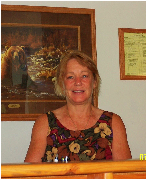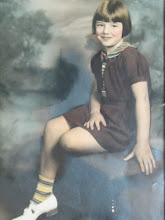
In 1930 , December came puffing and blowing, dumping immence skies full of snow over Puget Sound. Numbing Arctic winds finger-painted the scene with silvery strokes and on one particular snow-filled morning a Western Washington farming community went about its business. at 10:30 a.m. a mournful, drawn-out whistle led a swaying freight train out of the deep forest to halt at the wooden water tower where it would spend an hour- and-a-half taking on a fresh supply
Thus begins a true-to-life tale.
PART 1
The trains carried the men from one ocean to the other, then back again; men who had taken to the open road for one reasons or another. Some were good men, some maybe not so good, but a large number were husbands and fathers striving to come through for the families waiting at home. Finding even the bare requirements of dood on a daily basis was a challenge. Every day hundreds of down-at-the-heels men app;roached hundreds of back doors across the country hoping for wood to chop or ditches to dig in exchange for a meal.
Women bore their own kind of burden;months taken up with trying to fill children with scanty rations and imaginations.
LIttle old Mrs. Moore had no such worries. The modest farm produced plenty for the two of them. She and her husband Knapp, had raised their one child long ago and soon would be celebrating their 60th wedding anniversary. She put anothehr stick of wood in the cook stove, check on the baking bread in the oven and eased down into the waiting rocking chair.
As the train gave a long, steamy, "Sheeeeeeesh," a long man jumped down from one of the middle boxcars, pulled his tattered overcoat close around his neck and took off at a slow and cumbersome run across the frosty field.
Nearby Mrs. Moore had heard the whistle. She roused herself, put on a pot of coffee and began to slice potatoes and ham into a frying pan. He would be hurrying along now, one of the fellows who, "rode the rails" in these hard times. There was never more than one man at a time looking for a hand out at the Moore farm on the daily runs. This seemed to be the procedure amongst the travelers. Farmers in other areas reported the same routine. The elderly lady continued to work at the stove and decided she would have her visitor cut some kindling.
When the box in the woodshed was full of newly chopped kindling he took an armload and walked to the back porch. After dumping the wood into a container near the back entrance he shook the snow from his worn coat, slapped his hat against his leg and entered the country kitchen. He looked to be about 35 years-old . His face was craggy and thin, almost to the point of gauntness, with cheeks reddend by too many winter rides in icy boxcars.
She chatted of this and that, plaing dishes and utensils on the table while pointing him to the wash basin and a hanging towel.
He didn't talk much , spending his energy on the food in front of him, but nodded politely when he felt a response was necessary. His, hostess, seated at last with her own cup of coffee, thought she saw him send a fleeting glance of longing toward the tiny decorated fir tree in the dim parlor. But, if so, it was quickly suppressed. Then, as he was finishing up the last scraps of the meal she watched as his eyes wandered to the back door window. There was a large card there, suspended by a string and facing the outside.
"I know," she said, though he hadn't asked, "We can't see it from in here. I just never got around to turning it around. It's what the angels told the shepherds," 'Peace on earth, good will to men."
Her grey head turned toward the message, "Seems to me we humans get that backwards today. We keep wanting thhe peace, and all the things that go with it, without giving the good will first."
The sojourner put down the checkered napkin and asked without much interest, "What is good will anyway?"
Almona Moore massaged one arthritic hand with the other, thinking carefully about her answer. "Well, it's wanting to be helpful," she said, "It's looking for, being aware of--no, it's looking for opportunities to be giving even when it isn't so easy. It's a willingness, an attitude. Yes, that's it. It's an attitude of kindness."
The man answered, "Hmm."
Suddenly Mrs. Moore spotted a sack on the chair by the door. She rose as quickly as her 80 year-old arthritic body would allow, put her hand to her cheeck and keened, "Oh, dear my poor husband has forgotten his lunch." She glanced at the clock on the shelf. It showed 11:45, There was still time if...her visitor saw the clock also.
"You see," the woman continued frowning, "My husband had a chance to make a little money today reparing a neighbors fence, but he's not even completely over being sick and he just can't go without this meal. What in the world can I do?" The faded blue eyes looked straight at the man sitting at her table
"Well, how far away is this neighbor?"
"A mile or so down the road," was the hopeful answer as she pointed in the opposite direction from the halted train.
Rising to shrug into his coat, the man replied, "Sure do thank you for the food, Ma'am, but I can't do that. Gotta get that train. I'd have to walk clean into Tacoma otherwise."
The lady sat back down, holding tightly to the sack, and sighed, "Yes. well, goodbye then."
A gust of frigid air came in as the man went out. "So long, Ma'm. Sorry."
He walked 10 paces in the crunchy snow and stopped. Slowly, by small jerks, he turned his head and looked over his shoulder. He could see that sign as if it had a built-in light. That one word sure looked brighter than the rest. GOODWILL. He couldn't figure how he missed seeing that on his way in. He growled, "Shoot!" as if somebody was giving him an arguement, and kicked at a mound of snow. Finally he turned reluctently all the way around and began to retrace his steps. The door opened before he knocked and Mrs. Moore handed him two sacks. "Straight down this road, Son. Mr. McGreggor's place. You can't miss it. Biggest barn you ever saw. Oh, Yes, and that large bag is for you. I wrapped up that ham shank, some bread and a few winter apples for later.
The fellow shook his head and took the bags. "How did you know I'd go?"
"Just thought I saw a lot of goodwill in you young man."
"Yeah, and I'll regret it when I find myself shiverin' in somebody's haystack tonight."
"No," she said firmly, "You won't."
He surely did shiver that night, but there was a warm spot somewhere near the area of his heart that kept from getting in at all.








Hey Audrey! I thought you'd decided to run off to the jungle or something; I have missed you. That is a beautiful story. It gets to the heart of the things our Saviour tried to teach us. I loved it. It made me cry while it cheered my heart. Thank you and I want to wish you a wonderful CHRISTmas.
ReplyDeleteDebbie
Great writing, Audrey!!!!
ReplyDeleteVery heart - touching post Audrey...I am so glad you keep on posting even though I know it is hard for you to wrestle with the computer and blogging perplexities!
ReplyDeleteYour grandparents were blessed to have a writer for a granddaughter! Every family needs a good writer born into it every few years!
ReplyDelete